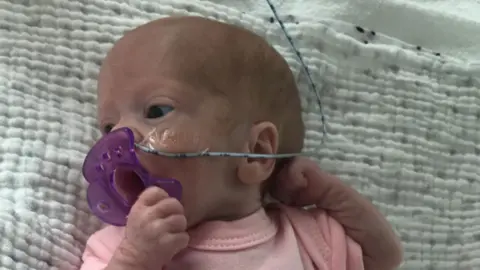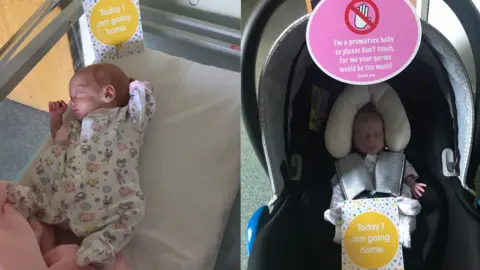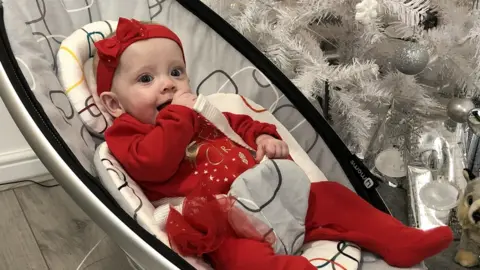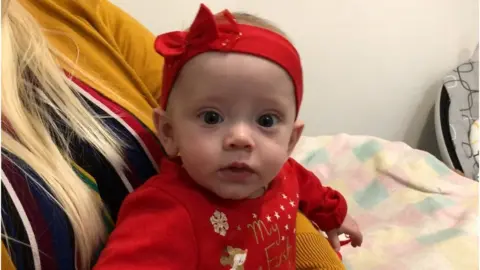Premature baby's first Christmas: 'I didn't think she'd survive'
"Seeing how small she was, I just didn't think she was going to survive."
First-time mother Jaymie Cannon sits with little Ivy-Rose on her lap, ready to celebrate a Christmas she feared her daughter would not live to see.
Ivy had stopped growing in the womb and with her mother's placenta ageing too quickly, doctors delivered her at 30 weeks' gestation to save her life.
But she was not out of the woods yet. Ivy had a bowel disease only found in newborns, which is fatal in some cases.
Jaymie's difficulties had started at 27 weeks of pregnancy when she noticed she was feeling fewer movements from the baby.
Investigations showed Ivy had stopped growing at around 26 weeks.
"They said on the scan it was showing that the placenta was too mature for her age," said Jaymie.
"So the placenta was a lot older than the baby so the placenta would have died before [reaching full term].
 Jaymie Cannon
Jaymie Cannon"The plan was to go to 35 weeks, because then the placenta would have been [the equivalent of] 40 weeks, but we didn't make it to 35 weeks."
Jaymie, who lives in Pontyclun in south Wales and works at the Royal Mint, was having regular scans and was being monitored every other day as she was also losing fluid from the womb.
"I went in for monitoring one day just thinking it was a normal day, and the heart just kept dropping. They called the shots and said 'no more', and she just had to come out," she said.
She was given a stark warning. "The consultant shut my curtain in the day assessment unit and said, 'I'm so sorry but it's not looking good.
"'You need to prepare yourself because we don't know what she will come out like'."
 Jaymie Cannon
Jaymie CannonIvy was delivered by emergency caesarean section at the Royal Glamorgan Hospital in Llantrisant, Rhondda Cynon Taf on 19 May, weighing just 1.8lb (820g).
She spent her first three days there but doctors suspected she had a bowel inflammation disease called necrotising enterocolitis (NEC) and was transferred to the special care baby unit at Cardiff's University Hospital of Wales (UHW).
Jaymie and her partner Scott Jeffs entered the "rollercoaster" world of neonatal intensive care. "You go forward and then you take about 10 steps back," she said.
Ivy was so tiny and fragile that no-one was allowed to touch her at first, but even once she was given permission from staff, Jaymie felt too frightened to hold her daughter.
She said: "I can remember saying no. I just didn't want to hold her, and every day I was saying no. How could you take such a little baby out of an incubator?
"I remember the dad next to me just turned around and said, 'you'll love it, just have a hold'.
"And I thought, fine, I'll listen, and it was the best thing I ever did. I felt so much love for someone so small."
 Jaymie Cannon
Jaymie CannonAs well as NEC, Ivy had other problems to cope with. She had been born already suffering from anaemia and had suspected sepsis.
Jaymie explained: "She was completely see-through. They normally come out red - she was white."
Ivy was immediately given a blood transfusion and had a total of four within the first two months of her life.
Because of the NEC, she could not be given milk for two weeks so was fed a mixture of protein and fats through a "long-line", a drip placed directly into Ivy's vein.
At one stage she was a day away from having an operation as she had not managed to pass stools at all and doctors feared she had a rotated bowel.
"They said to me, this operation could be life-threatening because this baby is way too small," Jaymie said.
"They said they'd hold off one more day and I remember going in and thinking, please be something in the nappy. And there was. I've never been so happy to find something in the nappy."

Like some other mothers of premature babies, Jaymie struggled to produce enough breast milk once Ivy was able to take milk feeds so she was fed using donated breast milk, because formula can be a risk for babies with NEC.
"You feel hopeless because it's the only thing you have left to be connected and then to know you've got to give someone else's milk - it is hard, but it's for the best," she said.
Ivy was discharged a few weeks before her due date of 27 July, weighing 3lb 6oz (1.5kg).
Jaymie said the support she had got from the nurses and other parents on the ward had been the only thing that had helped them get through the two-month hospital stay.
As a way of saying thank you, she has raised money for the Special Care Infant Parent Support (Scips) charity at UHW.
For Christmas, Jaymie's extended family planned a Christmas Eve get together over a meal out.

She added: "On Christmas Day we'll spend our first Christmas at home because it's a new house as well for us, and then we'll be visiting everyone."
Seven months on, Ivy is still a petite baby at 10lb 7oz (4.7kg) and is seeing a haematologist to monitor her blood iron levels, but she has started making her own red blood cells and is catching up on her development.
Jaymie said: "We do a lot of swimming and I think swimming has brought her on so much. She's one of the best in the class, they say. She's getting there slowly."
